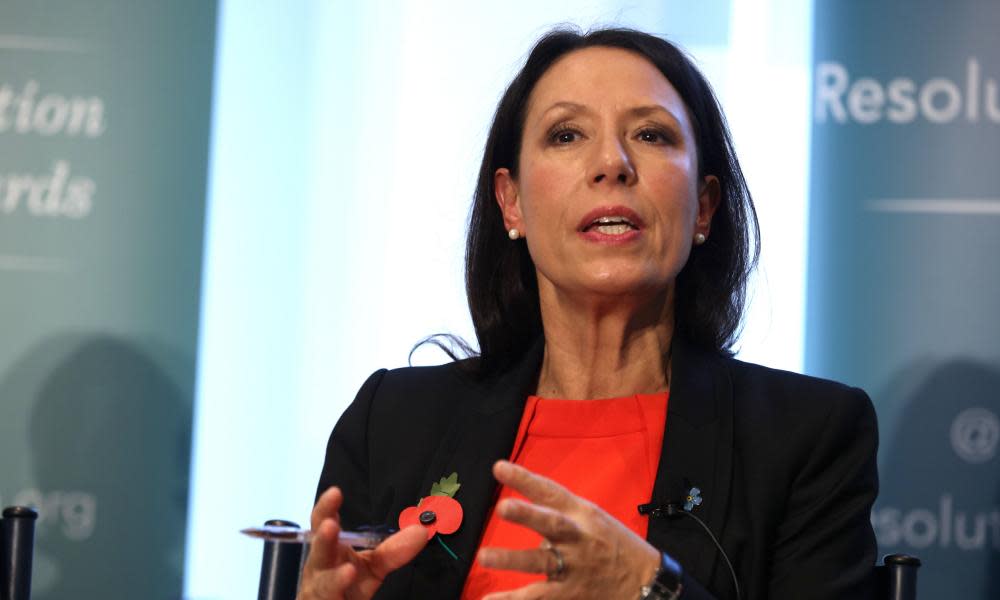Labour attacks universal credit as 'not fit for purpose'

Labour has unveiled a list of demands to improve the rollout of universal credit, seeking to keep up the pressure on Philip Hammond over the issue before Wednesday’s budget.
The shadow pensions secretary, Debbie Abrahams, has written to the chancellor demanding changes to UC, which Labour and other critics say is putting people in debt as it is rolled out into new parts of the country.
The main request is to reduce the initial six-week wait for a payment under the system, which is designed to replace a range of other benefits such as tax credits and housing benefit.
Charities working with claimants have said the six-week wait tends to put people into arrears, especially with their rent, and means they have to seek support from food banks. There has been speculation the government is planning to reduce this period.
What is universal credit?
Universal credit is the supposed flagship reform of the benefits system, rolling together six benefits (including unemployment benefit, tax credits and housing benefit) into one, online-only system. The theoretical aim, for which there was general support across the political divide, was to simplify the benefits system and increase the incentives for people to work, rather than stay on benefits.
How long has it been around?
The project was legislated for in 2011 under the auspices of its most vocal champion, Iain Duncan Smith. The plan was to roll it out by 2017. However, a series of management failures, expensive IT blunders and design faults have seen it fall at least five years behind schedule.
What is the biggest problem?
There is a minimum 42-day wait for a first payment endured by new claimants when they move to universal credit (in practice this is often up to 60 days). For many low-income claimants, who lack savings, this in effect leaves them without cash for six weeks. The well-documented consequences for claimants of this are rent arrears (leading in some cases to eviction), hunger (food banks in universal credit areas report striking increases in referrals), use of expensive credit, and mental distress.
Are there other problems?
Plenty. Landlords are worried about the level of rent arrears racked up by tenants on universal credit. Unchecked, this will lead to a spike in evictions. Claimants complain that universal credit is bafflingly complex, unreliable, and difficult to manage, particularly if you are without internet access. Multibillion-pound cuts to work allowances imposed by the former chancellor George Osborne mean universal credit is far less generous than originally envisaged. According to the Resolution Foundation thinktank, about 2.5m low-income working households will be more than £1,000 a year worse off when they move on to universal credit.
Abrahams is also seeking an option of fortnightly rather than monthly payments, a change to the assessment period and modifications to ensure that the benefit always rewards people for finding more work.
In a separate article for the Guardian, Abrahams said there was increasing evidence that UC “is not fit for purpose – and Labour believes the budget is a chance to fix it”.
The original aims of the system – to simplify social security support, ensure people were always better off in work than on benefits and reduce child poverty – were laudable, and had been supported by Labour, Abrahams wrote.
“But UC is failing to deliver on its objectives, as we have heard from respected charities including Child Poverty Action Group, Trussell Trust, Citizens Advice and Gingerbread. Even former government advisers, civil servants and UC’s own architects are now critical of the scheme,” she added.
The system’s inherent problems were made worse by benefit cuts imposed in 2015, she added.
“As it is being rolled out, universal credit is pushing people into debt and rent arrears, with many people in social and private rented housing being served eviction notices.”
As well as the six-week initial wait, and obligatory monthly payment, Abrahams highlighted UC’s lack of responsiveness to the changes in income of self-employed people.
“The problem is that this is assessed on a monthly basis, with no discretion for the natural peaks and troughs of self-employed work, or indeed for the niceties of the occasional holiday,” she wrote.
“Should they take a Christmas break, many self-employed people may suddenly find they have not met the [Department for Work and Pensions] work requirements, and be sanctioned as a result.
“If you’re thinking this doesn’t affect you, I’m sorry to say that might change, with the government planning to roll out ‘in-work conditionality’. This would require people who are working to report to the jobcentre and demonstrate they are seeking more hours, or face their UC support being cut.”
Most serious, Abrahams warned, were cuts to benefit levels, citing a forecast from the Child Poverty Action Group that reductions to UC would put a million more children into poverty by 2022.
Hammond could begin to fix the situation in the budget, Abrahams said, by reducing the six-week wait, allowing rent to be paid directly to landlords, allowing payments to be split between partners, improving flexibility for self-employed claimants and restoring the cuts to work allowances.
“Anything less won’t make UC fit for today’s labour market,” she wrote. “Anything less will sentence a million more children to be brought up in poverty. Anything less will mean that this prime minister’s promise to tackle ‘burning injustices’ is no more than empty rhetoric.”

 Yahoo News
Yahoo News 
